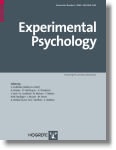
EXPERIMENTAL PSYCHOLOGY
Scope & Guideline
Innovating insights into the intricacies of human behavior.
Introduction
Aims and Scopes
- Cognitive Development and Learning:
Research in this area explores how cognitive abilities develop over time, particularly in children and adolescents. Studies often examine the impact of various experiences and interventions on learning outcomes. - Emotion and Affective Processing:
This focus area investigates how emotions influence cognitive processes such as memory, attention, and decision-making. Research includes examining emotional responses to stimuli and the role of affective factors in psychological phenomena. - Bilingualism and Language Processing:
The journal publishes studies that delve into the cognitive implications of bilingualism, including how language experience affects cognitive functions such as memory, comprehension, and social perception. - Neuroscience and Cognitive Mechanisms:
Integrating neuroscience with psychological research, this area looks at brain-behavior relationships and how cognitive processes can be understood through neural mechanisms. - Experimental Methods and Data Analysis:
A significant emphasis is placed on innovative experimental designs and statistical methodologies, aiming to enhance the rigor and reproducibility of psychological research. - Social and Cultural Influences on Cognition:
Research often examines how social contexts and cultural backgrounds shape cognitive processes, including perception, memory, and language use.
Trending and Emerging
- Interdisciplinary Approaches to Cognition:
Recent publications emphasize the integration of insights from neuroscience, linguistics, and computer science to better understand cognitive processes, indicating a trend towards interdisciplinary research. - Impact of Aging on Cognitive Functions:
There is a growing interest in how aging affects various cognitive processes, including memory, attention, and language processing, reflecting an increased focus on geropsychology and cognitive resilience. - Cognitive Control and Executive Functions:
Research investigating cognitive control mechanisms, including proactive and reactive control, has become more prevalent, highlighting the importance of understanding executive functions in various contexts. - Emotional and Social Cognition:
Emerging studies are increasingly focused on the interplay between emotion and social cognition, exploring how emotional states influence social interactions, perceptions, and behavioral responses. - Online and Digital Contexts in Psychology:
With the rise of digital communication, research examining psychological phenomena in online settings is trending, indicating a shift towards understanding cognition in the context of technology and social media.
Declining or Waning
- Traditional Memory Models:
Research focusing on classical memory models and their limitations has decreased, as the field shifts towards more integrative and computational approaches that consider the complexities of memory systems. - Simple Reaction Time Studies:
Papers centered on basic reaction time tasks are less frequent, reflecting a trend towards more complex experimental designs that investigate the interplay of multiple cognitive processes rather than isolated measures. - Basic Visual Perception Research:
While still relevant, the focus on fundamental visual perception studies is waning. The journal is moving towards more applied research that examines visual perception in real-world contexts or integrates findings with other cognitive domains. - Static Language Processing:
Research solely examining static language comprehension without considering contextual or dynamic factors is less common, as the journal emphasizes studies that account for the complexities of language in social contexts.
Similar Journals
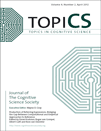
Topics in Cognitive Science
Decoding the Complexity of Cognitive ProcessesTopics in Cognitive Science, published by WILEY, is a premier interdisciplinary journal that advances the understanding of the cognitive processes that underpin human behavior and interaction with technology. With a commendable impact factor and a strong focus on research from 2009 to 2024, this journal garners significant attention in various subfields, as evidenced by its Q1 ranking in Experimental and Cognitive Psychology and Linguistics and Language, alongside a Q2 position in Artificial Intelligence, Cognitive Neuroscience, and Human-Computer Interaction. Researchers and professionals will find invaluable insights into the latest experimental findings, theoretical discussions, and practical applications that bridge cognitive neuroscience, psychology, and computer science. Topics in Cognitive Science is especially pivotal for those aiming to delve deeper into cognitive mechanisms and their implications within our increasingly digital world, making it an essential resource for students and scholars alike.

Eksperimentalnaya Psikhologiya
Exploring the depths of mind and behavior.Eksperimentalnaya Psikhologiya is a prominent open-access journal published by the Moscow State University of Psychology and Education, dedicated to advancing the field of psychology. Since its inception, the journal has offered a platform for the dissemination of innovative research in Experimental and Cognitive Psychology, as well as Neuropsychology and Physiological Psychology. The journal's commitment to open access, initiated in 2015, ensures that valuable research findings are freely available to scholars and practitioners worldwide. Although currently categorized in the Q4 quartile for 2023 within several psychology disciplines, it plays a vital role in promoting a diverse range of psychological studies and fostering interdisciplinary collaboration. With a focus on experimental methodology and cognitive processes, Eksperimentalnaya Psikhologiya provides a valuable resource for researchers, professionals, and students seeking to deepen their understanding of psychological science. The journal invites contributions from across the globe, particularly in the evolving landscapes of experimental techniques and neuropsychological research.

JOURNAL OF EXPERIMENTAL PSYCHOLOGY-GENERAL
Elevating Standards in Psychological ScholarshipJOURNAL OF EXPERIMENTAL PSYCHOLOGY-GENERAL, published by the American Psychological Association, is a leading journal in the field of experimental and cognitive psychology. With an ISSN of 0096-3445 and a robust impact factor that reflects its significant contribution to research, this journal serves as a premier outlet for empirical studies that advance our understanding of psychological processes across development and cognition. Covering a wide array of topics from developmental neuroscience to general psychology, it is categorized in the Q1 quartile across multiple fields, making it a vital resource for researchers, professionals, and students alike. The journal has maintained a consistent publication record since its inception in 1975, continuously freeing insights that shape the future of psychology and related disciplines. With rigorous peer review and high standards of scholarly excellence, JOURNAL OF EXPERIMENTAL PSYCHOLOGY-GENERAL remains an essential platform for disseminating innovative psychological research.
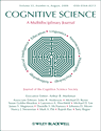
COGNITIVE SCIENCE
Pioneering Research in the Realm of CognitionCOGNITIVE SCIENCE, published by WILEY, is a leading academic journal that delves into the complexities of human cognition through an interdisciplinary lens. With an ISSN of 0364-0213 and an E-ISSN of 1551-6709, this journal has made significant strides in the field since its inception in 1977, ample coverage through to 2024, and a commendable Q1 and Q2 categorization in Experimental and Cognitive Psychology and Cognitive Neuroscience as of 2023. The journal is positioned at the intersection of various disciplines, ranking #65 out of 165 in Experimental and Cognitive Psychology and #58 out of 115 in Cognitive Neuroscience, highlighting its relevance and contribution to advancing knowledge in these areas. Although it does not offer open access, COGNITIVE SCIENCE remains an essential resource for researchers, professionals, and students seeking to explore groundbreaking research and theoretical insights within the vast domain of cognitive science.
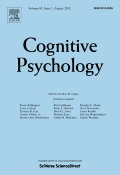
COGNITIVE PSYCHOLOGY
Advancing Insights in Cognitive ScienceCOGNITIVE PSYCHOLOGY is a premier academic journal published by Academic Press Inc. Elsevier Science, specializing in the dynamic and evolving field of cognitive psychology. With a significant history spanning from 1970 to 2024, this journal has established itself as a critical resource for researchers and professionals alike, boasting a distinguished ranking in the Q1 category across multiple disciplines, including Experimental and Cognitive Psychology, Neuropsychology, and Artificial Intelligence. Its impact factor, reflective of its influence and reputation within the academic community, positions COGNITIVE PSYCHOLOGY as an essential platform for disseminating cutting-edge research and theoretical advancements. Although it is not open access, subscribers gain exclusive insights into the latest findings that drive the field forward. The journal's commitment to fostering innovative research makes it an indispensable tool for those dedicated to understanding the complexities of human cognition.
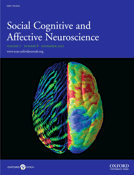
Social Cognitive and Affective Neuroscience
Pioneering Research in Emotion and CognitionSocial Cognitive and Affective Neuroscience, published by Oxford University Press, is a leading academic journal in the fields of cognitive neuroscience and experimental cognitive psychology. With an impact factor placing it in the Q1 category across three disciplines, including medicine, this journal stands at the forefront of research, promoting innovative studies that explore the intricate relationship between social processes and neural mechanisms. Since becoming Open Access in 2017, it has enhanced accessibility for researchers worldwide, facilitating the dissemination and discussion of groundbreaking findings. The journal, which has evolved significantly since its inception in 2006, is ranked among the top 10 in experimental and cognitive psychology and is highly regarded within the cognitive neuroscience community, making it a crucial resource for professionals, academics, and students eager to advance their understanding of the neural substrates underlying social cognition and emotion. The editorial board invites submissions that contribute to the interdisciplinary dialogue surrounding these critical areas of research, ensuring that the journal remains a vital platform for scholarly exchange.

Neuropsychologia
Pioneering Research at the Nexus of Psychology and NeuroscienceNeuropsychologia, published by PERGAMON-ELSEVIER SCIENCE LTD, is a premier journal that delves into the intersections of psychology and neuroscience, specifically focusing on behavioral and cognitive processes. Since its inception in 1963, this esteemed journal has been a vital platform for researchers, professionals, and students, showcasing innovative studies and advancements in the fields of Behavioral Neuroscience, Cognitive Neuroscience, and Experimental Psychology. With a commendable impact factor, placing it in the Q2 category across multiple disciplines, Neuropsychologia is recognized for its contribution to the scientific community, ranking among the top journals in both Experimental and Cognitive Psychology and Neuroscience. The journal's commitment to excellence is evident in its rigorous peer-review process and its mission to disseminate cutting-edge research, making it an invaluable resource for those seeking to expand their knowledge and insights in neuropsychology. For further reading, the journal is accessible in both print and digital formats, ensuring that researchers can easily engage with the latest findings and theoretical advancements in this dynamic field.
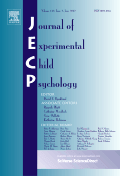
JOURNAL OF EXPERIMENTAL CHILD PSYCHOLOGY
Advancing the Frontiers of Child Psychology ResearchJOURNAL OF EXPERIMENTAL CHILD PSYCHOLOGY, published by Elsevier Science Inc, stands as a premier outlet for high-quality research in the fields of Developmental and Educational Psychology and Experimental and Cognitive Psychology. With an impressive impact factor and recognized within the Q1 category for both developmental and experimental psychology, this journal is dedicated to advancing our understanding of child psychology through rigorous empirical research and theoretical contributions. Indexed with an ISSN of 0022-0965 and E-ISSN 1096-0457, it is a vital resource for scholars aiming to explore the complexities of children's cognitive, social, and emotional development from 1964 to 2024. Engaging with this journal provides researchers, professionals, and students access to cutting-edge findings that inform practice, policy, and future studies in the ever-evolving landscape of child psychology.

VOPROSY PSIKHOLOGII
Fostering Dialogue in the World of PsychologyVOPROSY PSIKHOLOGII, a prominent journal in the field of psychology, has been publishing insightful research since its inception in 1960. With a focus on various aspects of psychological research, this journal offers a platform for the dissemination of knowledge and advancements in the discipline within the Russian Federation and beyond. Published by MEZHDUNARODNAYA KNIGA, the journal provides access to a diverse range of studies and theoretical discussions, although it currently does not offer open access. As of 2023, it holds a category quartile ranking of Q4 in miscellaneous psychology, reflecting its niche position within the broader psychological community. Despite its lower Scopus rank at #206 out of 216, the journal remains a valuable resource for students, researchers, and professionals seeking to engage with emerging trends and ideas in psychology. VOPROSY PSIKHOLOGII continues to contribute significantly to the academic dialogue, inviting engagement from scholars dedicated to exploring the complexities of human behavior.

JOURNAL OF EXPERIMENTAL PSYCHOLOGY-APPLIED
Exploring Innovative Applications of Psychological ScienceThe JOURNAL OF EXPERIMENTAL PSYCHOLOGY-APPLIED, published by the American Psychological Association, is a premier outlet for cutting-edge research in the field of Experimental and Cognitive Psychology. With an impressive impact factor indicated by its Q1 ranking in 2023, this journal stands as a leading resource for scholars and practitioners, fostering a deeper understanding of the applications of psychological principles. With its extensive coverage from 1995 to 2024, the journal delivers a wealth of empirical studies, theoretical discussions, and methodological innovations that inform both academic learning and practical implementations in psychology. Although the journal does not offer open access options, researchers can gain insights into its influential findings through libraries or institutional subscriptions. Located in Washington, DC, it serves as a critical platform for disseminating high-quality research that bridges the gap between theory and real-world applications, supporting the advancement of knowledge in the vital area of human cognition and behavior.